EDIT: I realize that the code in my OP is long and hard to read. I've highlighted the problem with 4 lines of code.
char **t = {"Hello", "World"};
char **a = t;
++(a[0]);
printf("%c\n",**t);
I want to increment through the array of strings without losing the pointer to the first character. Therefore, I initialize a new pointer 'a' to point to the first character. After I increment the 'a' pointer, though, it seems to change what 't' points to! In the printf statement, I expect that t's pointer value remain unchanged, but it seemed to increment with 'a' and now points to the second character. Why is this happening?
SOLVED: In the above example, a and t seem to be the same pointer so if I change one (by incrementing for example), the change is also reflected in the pther. However, if I dereference t into another variable, then I can change said variable without having that change reflected in t. In the above example, this looks like
char *a = t[0];
++a;
printf("a value: %c\n", *a);
printf("t value: %c\n", **t);
I think that I had originally been confused about dereferencing since t points to a pointer. Every response I've gotten is to use array indexing as opposed to pointers, and I can see why.
ORIGINAL POST: Say I have:
array1 {"arp", "live", "strong"}, and
array2 {"lively", "alive", "harp", "sharp", "armstrong"}
I'm trying to find the strings in array1 that are substrings of any string in array2.
To do this, I wrote a helper function (compString) that takes in the string from array1, the entire array2, and the length of array2.
Essentially, what the function does is create local pointer values for both the string pointer and the array pointer. It then extracts the first string from array2 and begins to walk through it to find a match for the first letter of the input string. If no match is found, the function will move on to the next string, until a full match is found or until it walks through the entire array2. It then returns to its calling environment.
I ran into some unexpected behavior. When I call the function (with the same arguments), after having already called it, the array pointer seems to point to exactly where it left off in the previous call.
For example, if I call compString("arp", array2, 5) then the function will flag a match starting at the a in harp.
Then, if I call compString("live", array2, 5), the function begins at the a in harp and goes to the end of the array without flagging a match.
Finally, when I call compString("strong", array2, 5), array2 is now pointing to garbage since it has already been iterated through, and does not flag a match.
Since one of the first things the helper function does is "localize" the pointers being passed (that is, create a local pointer variable and assign to it the value of the pointer being passed to the funcion, then iterate that local variable), I would assume that subsequent calls to the function wouldn't "save" the previous value of the pointer. Any pointers?
Source attached:
#include <stdio.h>
#include <string.h>
int compString(char *, char **, int);
int main(void)
{
int sz1 = 3;
int sz2 = 5;
char *p, *p2;
char *array1[] = {"arp\0", "live\0", "strong\0"};
char *array2[] = {"lively\0", "alive\0", "harp\0", "sharp\0", "armstrong\0"};
compString("arp\0",array2,5);
compString("live\0",array2,5);
compString("strong\0",array2,5);
}
int compString(char *arr1, char **arr2, int sz2)
{
printf("\n\n\n");
printf("WORD: %s\n",arr1);
int i = 0;
char *a1 = arr1;
char **a2 = arr2;
char *p;
char *p2;
printf("BEGIN ITERATION %d\n",i);
printf("Checking against word: %s\n",a2[i]);
while (i < sz2)
{
printf("%c\n",*a2[i]);
if (*a1 == *a2[i])
{
char *p = a1;
char *p2 = a2[i];
while ((*p == *p2) && (*p != '\0'))
{
++p;
++p2;
}
if (*p == '\0')
{
return 1;
}
else
{
*++(a2[i]);
if (*(a2[i]) == '\0')
{
++i;
printf("BEGIN ITERATION %d\n",i);
printf("Checking against word: %s\n",a2[i]);
}
}
}
else
{
*++(a2[i]);
if (*(a2[i]) == '\0')
{
++i;
printf("BEGIN ITERATION %d\n",i);
printf("Checking against word: %s\n",a2[i]);
}
}
}
return 0;
}
